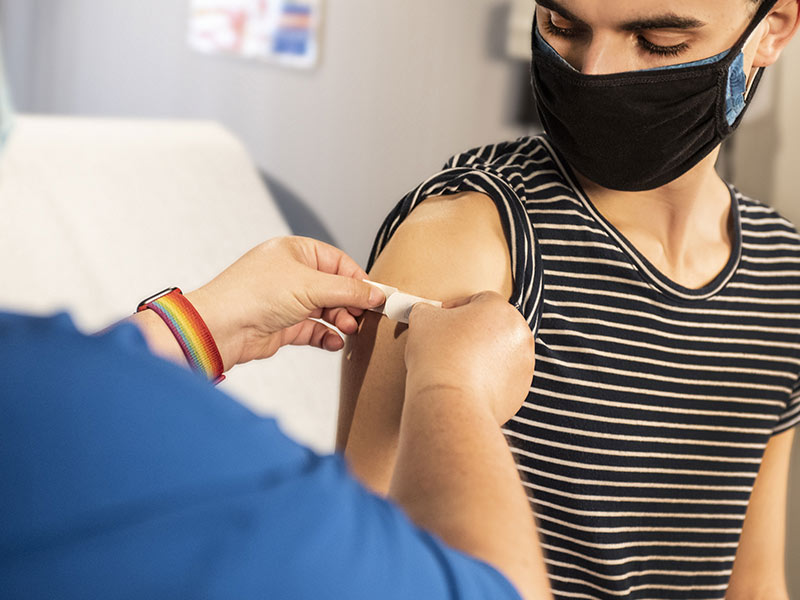
ZyCoV-D, the COVID-19 vaccine developed by Ahmedabad-based pharmaceutical firm Zydus Cadila, got the emergency use authorisation (EUA) from India’s drug regulator on August 20. Although it is the sixth jab to get the nod in India, it is the vaccine of many firsts. Not only is it the first to be approved for children of ages 12 to 18, but it is also the world’s first DNA vaccine against the novel coronavirus (SARS-CoV-2). Also, this three-shot vaccine is needle-free, thus is far less painful than other vaccines approved in India, which need a needle to be administered. Here is your guide for the Zydus Cadila’s vaccine against COVID-19:
Table of Content:-
About ZyCoV-D Vaccine

(Photo Credit: Unsplash)
Zydus Cadila’s COVID vaccine is a plasmid DNA vaccine. A plasmid is a small, circular, double-stranded DNA molecule, found distinct from the better-known chromosomal DNA. Thus, ZyCoV-D uses this plasmid DNA to elicit an immune response against the SARS-CoV-2 virus that causes COVID-19.
How Does ZyCoV-D Work?
Once injected the plasmid tricks the recipient’s body to produce the spike protein of the coronavirus. The spike proteins are the spike-like substances that protrude from the outer envelope of the virus. The spike proteins are what latch the coronavirus on the human cell, allowing it entry into our bodies. As the plasmid makes the body produce the spike protein, the body sees it as an invader and initiates an immune response.
ZyCoV-D: Needle-free COVID-19 Vaccine
Another aspect that makes this vaccine unique is the way it will be administered. Unlike the other vaccines, ZyCoV-D doesn’t need a needle and is administered with a device that delivers it as a narrow stream of fluid that gets into the skin. This could prove to be crucial in overcoming vaccine hesitancy among children and some adults.
Also read: When Can Women Take COVID Vaccine After Delivery? Answers Expert
ZyCoV-D: Doses And Efficacy
Most COVID-19 vaccines currently in use require two doses. Zydus Cadila’s ZyCoV-D, on the other hand, has a three-shot regimen. There is a gap of 28 days between the first and the second dose and between the second and the third. Regarding efficacy, in the phase 3 clinical trial involving 28,000 participants, ZyCoV-D showed the efficacy of 66.6% among symptomatic COVID-19 cases. This was also the first trial that included children of ages 12 and above.
ZyCoV-D’s Efficacy Against Delta Variants

(Photo Credit: Unsplash)
The drugmaker conducted the phase 3 clinical trials during April, May and June, i.e. during the peak of the second COVID wave in India. A large number of cases of the highly virulent Delta variant were reported then. As per the company, since the trials were conducted then, it shows the efficacy of the vaccine against this variant. First identified in India, Delta is a highly contagious mutant of the coronavirus, believed to be the reason behind the ferocious second COVID wave in India.
With the nod, ZyCoV-D became the second indigenous vaccine to be approved in the country, after Covaxin, developed by Hyderabad-based Bharat Biotech. It has been developed by Zydus Cadila and the Department of Biotechnology (DBT). Despite the nod, the vaccine isn’t expected before October, as per media reports. The government is also expected to make an announcement regarding vaccination for children, especially those with comorbidities and disabilities, around that time, several media houses reported. The announcement will be crucial as the third COVID wave might hit India in September-October and is expected to affect kids as severely as adults. Vaccination will play a major role in that. Also, this will help in steering India’s slow vaccination drive under which just 9.2% of the country’s population has been fully vaccinated.
Read more articles on Miscellaneous
Photo Credit: Unsplash
Also watch this video
How we keep this article up to date:
We work with experts and keep a close eye on the latest in health and wellness. Whenever there is a new research or helpful information, we update our articles with accurate and useful advice.
Current Version
